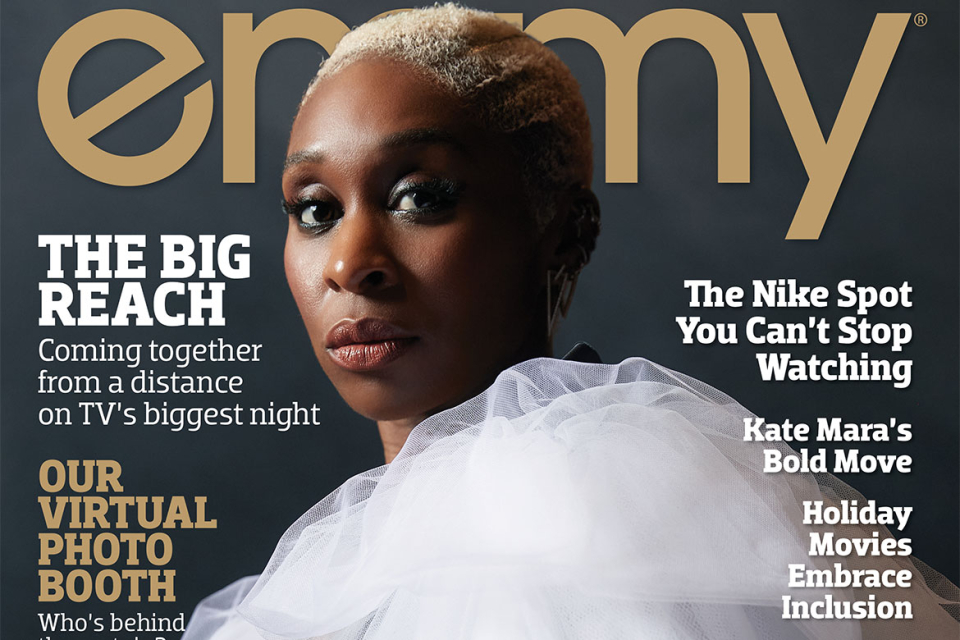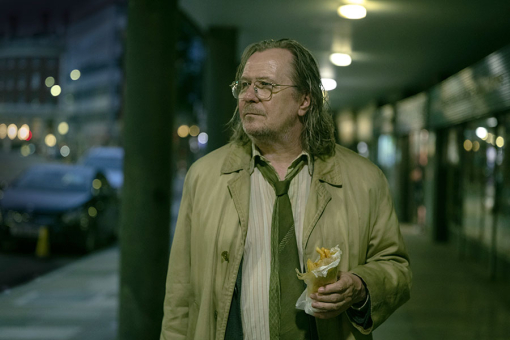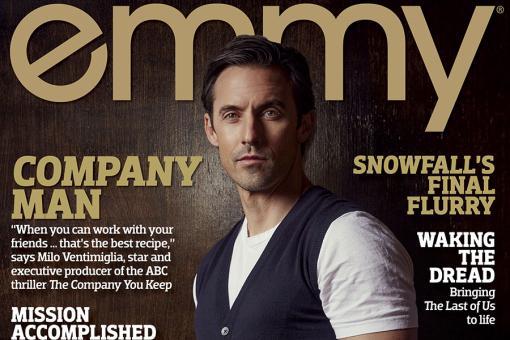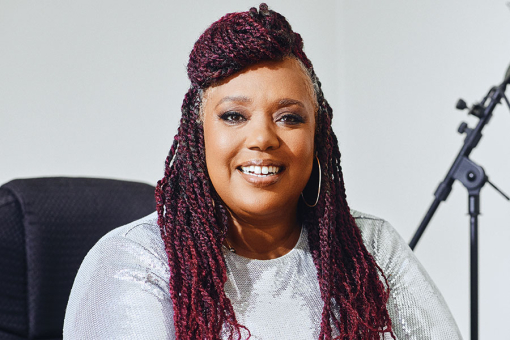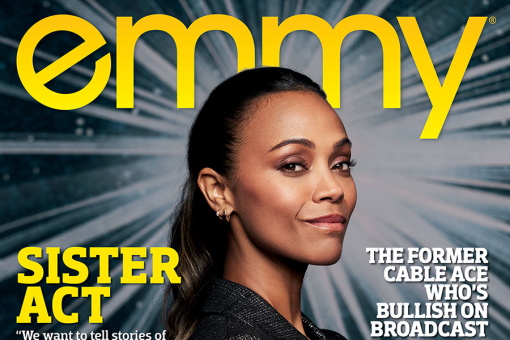On YouTube, a clip of Aretha Franklin on a 1974 game show has been viewed some 150,000 times.
If the platform's data scientists could attribute this popularity to a single viewer, it would likely be actress-singer Cynthia Erivo. "I can't stop watching it, but I don't know why," says Erivo, who was born and raised in the south of London and thus is unaware that she has been hypnotized by an episode of CBS's What's My Line?
Part of her fixation is how beautiful Franklin looks — a soft Afro, a flowy cream suit with butterfly collar and wide bell-bottom trousers, paired with high, chunky heels. "It's so sweet. She sort of shuffles out and sits down."
Most revealing to Erivo, though, is the sound of Franklin's voice once host Larry Blyden begins interviewing her. " Yes … no ," Erivo says, imitating Franklin's whispery responses. "She's sort of very waifish. And as you watch, the [host] sort of ends up leaning very close to her. I realized, 'Oooooh! She's making people come toward her.' I just loved it. This is how she draws them in."
Erivo has been listening to Franklin since she was a little girl. But what kicked her Queen of Soul mania into high gear was being tapped to portray the Detroit-born singer for the third season of NatGeo's award-winning Genius series.
Besides vintage game-show gazing, Erivo's deep dive included poring over biographies and rare interviews and watching and rewatching Amazing Grace, a 2019 concert film that documents the recording of Franklin's 1972 live gospel album of the same name. She spent untold hours listening to Franklin's entire catalogue, especially albums where Franklin interacts with her fans.
"The live albums are really wonderful to listen to because there's a pattern that she has," Erivo says. "It's just so great listening to her talking to the audience."
It's anyone's guess if Suzan-Lori Parks, the Pulitzer-winning playwright who serves as showrunner on Genius: Aretha, knew — when she first thought of casting Erivo — that she would soon be collaborating with a preparation fiend.
What she did know, though, was that the classically trained actress knows how to inhabit a character and how to belt out a tune, and that she has the awards to prove it.
Since making her Broadway debut only five years ago as Celie Harris in a revival of The Color Purple, Erivo has won a Tony (Best Leading Actress in a Musical), a Grammy (Best Musical Theater Album) and a Daytime Emmy (Outstanding Musical Performance, for a guest appearance with her Color Purple costars on NBC's Today).
"She was the first and only actor I wanted for the role," Parks says. "When I found out she was available, I was like, 'Oh my God. We have to have her play our Aretha Franklin.'" Then, as Parks was waiting at a restaurant for their first meeting, Erivo arrived, and when she walked toward their table, Franklin's rapturous love song "Daydreaming" unexpectedly began floating out of the restaurant's speaker system.
The two women looked into each other's eyes. Was it coincidence, or was someone bigger weighing in on casting? Parks recalls, "I told her, 'Sister, you've just been called.'" The eight-part series — whose debut date remained in flux at press time, due to Covid production delays — covers Franklin's life from age 12 to age 55. (Shaian Jordan makes her screen debut as Little Re, Franklin's younger self.)
Though several inches shorter than Aretha, onscreen Erivo has no trouble radiating Franklin's natural humanity and her aura of melancholy. Instead of taking the traditional route of lip-syncing to prerecorded tracks, Erivo sings live into a working mic. This wasn't just a way to show off her stirring, prize-winning voice; it also helped her wriggle deeper into the character.
"I personally think that when a person sings, it's like a little window into their soul, how they truly feel. It's the ultimate state of vulnerability," she says.
"The best singers, and not necessarily the best technically, are the most honest ones. Aretha was brilliant because she was an honest performer. So to sing a song live on set allowed me to [do more than] just sing it, but also access where it came from. To me, it's not just a song. It's 'This is how I am feeling right now.'"
She sings more than 20 songs in Genius, including showstoppers like "I Never Loved a Man the Way I Love You," "Baby, I Love You" and, of course, the gospel cornerstone "Amazing Grace."
Sitting post-photo shoot — pre-pandemic — in an upstairs rehearsal space at Hollywood's Complex Theater, Erivo, her short hair dyed pearl white, is in pristine gray workout pants, a black KITH shirt and a pair of Nike Air Max 1 DLX leopard-print sneakers with bright red laces. She doesn't need a song to spell out her emotions.
"I'm tired," she says. She came in just a few hours ago from the desert, where the Palm Springs International Film Festival gave her a Breakthrough Performance Award for the 2019 biopic Harriet.
That portrayal of abolitionist Harriet Tubman also netted her nominations from the Screen Actors Guild, the Golden Globes and the Oscars: a Best Actress nomination and a Best Original Song nod for "Stand Up," which she cowrote and performed for the film.
Kasi Lemmons, director and cowriter of Harriet, was confident that Erivo could bend her brisk, clipped London accent into a Maryland patois. She was also struck by the actress' physical similarities to the historical figure in terms of height and strength. But when Erivo first stepped in front of the camera, Lemmons says, it was clear something special was about to happen.
"I knew from the moment I saw her run across a field. The way she ran was as important as the accent, know what I mean? A good actor can do an accent. But she ran in character. If she ran like an athlete, it wouldn't be correct. But she ran like a woman who just happens to be fast and strong. It was amazing."
When Harriet was released in November 2019, reviewers tended to single out Erivo for her focused, authentic performance. "Erivo sells the physical and emotional evolution of a scared girl who becomes an empowered woman through her own sheer will and desire for justice," Tribune film critic Katie Walsh wrote.
Simultaneously, though, a fierce backlash sprang up on social media, criticizing both Erivo for taking roles from U.S. actors and Lemmons for hiring a Nigerian Brit to play an American freedom fighter.
"I understood what the issue was, but maybe not what it became," Lemmons says. "I understood the fundamental question of, 'This is an American hero. Why wouldn't an American actor play this part?' And I guess my answer is, 'The person who is perfect for the part should play the part.' [The controversy] didn't come as a shock to either one of us. But I think we were kind of shocked by how big, robust and kind of ugly it got."
Though she's only five-foot-one, Erivo has an unmistakably sturdy presence. ("She's a force of nature," Lemmons says. "She's tiny, but she's got so much power.") Even so, when the Aretha role came up, she had a moment of doubt: did she really want to be at the center of another negative tweetstorm?
"There was a small panic that there might be another foray, like all of the stuff that happened with Harriet," she says. Then she considered what it would feel like to say no. "I was like, 'I can't live fearfully when it comes to playing these roles.' I'm just playing the characters that have the best stories. That's it.
"If an Englishwoman comes along, I'll be playing that character, too. My job as an actor is to tell good stories. I [can't choose roles] to be safe and to appease people. I just can't do that."
It's hard to remember just how recently Erivo was an unknown. Back in 2013, after a toehold gig with the touring company of Sister Act, she landed the starring role in The Color Purple at the Menier Chocolate Factory, a 180-seat theater off London's West End.
"I was very excited. I had a big role in this little theater on this little stage. I was happy as Larry. Over the moon," Erivo says. But no one was more surprised than she when New York Times critic Ben Brantley showed up and weighed in. "He wrote, like, a love letter to me and the show," she recalls.
The next thing she knew, the show's producer was asking if she'd like to go to Broadway with the production. "I was like, 'Sure. Thank you. I'd love to.' But until it materialized, I wasn't putting all my hopes in it."
Even when the Bernard B. Jacobs Theatre was booked, a stellar cast (including Oscar winner Jennifer Hudson and Danielle Brooks of Orange Is the New Black) was assembled and Erivo was packing her suitcase, her younger sister, Stephanie, had to point out that her outlook needed recalibrating.
"The day I left, she said, 'Why are you leaving some of your stuff behind?' and I said, 'Because I'm coming back.' And she said, 'No, you aren't. You're not coming back.' She just knew ." ...
For the rest of the story, pick up a copy of emmy magazine HERE.
Take a peek behind the scenes of the cover shoot HERE.
This article appeared in its entirety in emmy magazine, Issue No. 11, 2020

